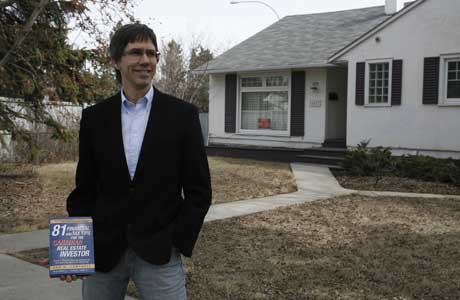Think long-term instead of speculating; look for a future, not a past
Paul Luke
Province

Author Don Campbell launches his new book, which offers tips for real-estate investors, advising them to buy for cash-flow in neighbourhoods with infrastructure improvements. Photograph by: Canwest News Service, Edmonton Journal
The biggest mistake a real-estate investor can make is to buy on a tip, property expert Don Campbell says.
Investors must back up their decisions with hard facts, treating exuberant gab from a friend with healthy skepticism, says Campbell, president of the Abbotsford-based Real Estate Investment Network.
Potential investors should seriously question advice flowing from conversations in a pub.
“They go out and buy a rental property because their uncle’s son did really well in real estate,” Campbell said in an interview. “Or they hear about a new golf course or airport expansion and they run out and buy.
“That’s just not sensible.”
Campbell explores these and other pitfalls of investing in his new book, 81 Financial and Tax Tips for the Canadian Real Estate Investor (Wiley, $36.95).
Campbell and his co-authors, Navaz Murji and George Dube, begin their book with a little avuncular advice: Don’t make the mistake of linking tax-avoidance tactics with business success.
“Since wealthy people pay large sums of money in taxes and poor people pay very little, you will want to focus on running a business that makes money,” the book suggests.
Never try to cheat the taxman, they warn. Never assume you can get away with something that breaks Canada’s tax laws.
Just because Canada’s income-tax act has grey areas subject to a great deal of interpretation does not make it easy to circumvent.
“It does mean a different pair of Canada Revenue Agency eyes may alter decisions and outcomes — even after you and your accountant have assumed a particular outcome has been dealt with,” the three authors advise in the book.
“What is ‘allowed’ this year may simply have been missed.“
When it comes to tax, the goal is to pay the tax you owe, and not any extra. It’s not about how much money you make, it’s about how much you keep, Campbell says.
Campbell, whose previous books include Real Estate Investing in Canada and 51 Success Stories from Canadian Real Estate Investors, makes a clear distinction between speculation and investment.
Speculators may buy a pre-built condo from a conviction that a market will continue to rise and that they can quickly flip their purchase.
“It’s like playing the futures game,” he says. “If you buy futures in oil or pork bellies, the only way to make money is to bet correctly.”
Investors, on the other hand, will buy a cash-flow rental property based on a 10-to-20-year time frame. The aim is to get a monthly cash flow that will gradually enrich them, he says.
“As long as you buy for cash flow, you don’t care about the gyrations of the marketplace,” Campbell says.
Savvy investment, Campbell says, is based on the outlook for a specific neighbourhood. He suggests it’s a good time to consider investing in Maple Ridge and Surrey because of infrastructure improvements there.
“You want an area where there’s a future, not a past,” Campbell says.
As a rule, real-estate prices in areas receiving federal or provincial infrastructure spending will rise 12 to 15 per cent faster than similar areas that have not been so blessed, Campbell says.
“If the market goes down again, prices there will go down 12 to 15 per cent slower,” he says.
Investors who have done their homework have factored in the coming end to the era of what Campbell calls “emergency interest rates.”
Variable-rate mortgages could climb by 1½ to 1¾ per cent over the next 18 months, he says.
“You’ve got to be realistic,” he says. “You’ve got to pressure-test your potential investment in advance.”
As far as the impact of the par-hungry loonie, Campbell says it may drive people to make ill-advised real-estate forays south of the border.
U.S. property may appear cheap to Canadians enjoying their vigorous buck but a currency risk still remains, he says.
The troubled state of the U.S. housing market is an issue. Current U.S. house prices may fall 10 to 12 per cent as another impending wave of foreclosures puts more inventory on the market, Campbell says.
And don’t forget the tax challenges of buying foreign property.
“Never buy a piece of real estate without knowing the tax implications, especially if you’re buying it outside of Canada,” he says.
Too often, small details of investing turn into large, money-sucking mistakes. Like not saving receipts.
To prove a relevant expense, an investor needs a receipt, an explanation for the cost and evidence of payment, Campbell says.
All of Campbell’s royalties for the book go to Habitat for Humanity, a non-profit group that builds affordable housing for people in need.
The Real Estate Investment Network provides its 3,200 members across Canada with research and investment strategies.
© Copyright (c) The Province

